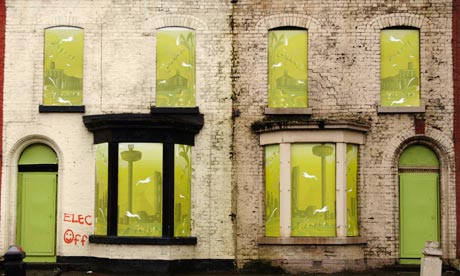
George Osborne gazes upon Madrid's meltdown and spies an excuse:the euro ate his recovery. The rest of us should look at how one of the biggest economies in Europe ended up in the sovereign-debt workhouse – and consider how closely Spain's catastrophe resembles our own.
Even while typing this, I know that the comparison sounds a stretch. The eurozone is a foreign country, after all: they do crises differently there. Here, ministers publicly congratulate themselves for still being able to borrow from financial markets, while the press rubbernecks at each new crash on the continent. After being bailed out by Gordon Brown, British banks are merely chronically weak, rather than flat-out with Spanish flu. But look past the financial details – the single-currency contagion, and all those acronyms beloved of Brussels – and the economic situations are more similar than we might like.
Just like Britain, Spain enjoyed an unprecedented era of low inflation and cheap money – and squandered it. Bankers in Madrid (and across the country) kept their excesses simple, shovelling cash into the pockets of semi-imperialistic property developers. Their counterparts in London did that too, but also found time to speculate in toxic assets with funny names. Just like Tony Blair, Spain's José Zapatero asked few questions during the boom, but concentrated on spending the bumper tax revenues on welfare and other well-meaning programmes to enhance social justice. The markets smiling upon them, neither New Labour nor Spain's socialists made serious attempts to reshape their economies or bring on new industries. Instead, an historic proportion of the young in both countries were sent off to university – coming out the other end overqualified for the jobs available to them. During the boom, the countries were considered such a success that they were given the ultimate benediction of a glossy American magazine cover. In 1997 Liam Gallagher and Patsy Kensit lounged in bed for Vanity Fair; in March 2004, Time declared: "Spain Rocks!"
In other words, both Britain and Spain spent years going full-speed down what appeared to be a highway to prosperity – only to discover too late that it was a dead-end street. After the crash, both have been left with broken economic models, while their governments haven't a clue how to fix them.
Nowadays, when smart economists discuss what's wrong in Spain, they point to places such as Andalusia. Poor and dependent on the north of the country for taxpayer handouts, it's proof of the lopsidedness of the country's boom, of a bubble that was always going to burst. Yet there were plenty of similar places in Britain, too, which went all but ignored by the Westminster classes.
To get an idea of the self-deceptions of Britain's boom, you could do worse than visit Kirkby in Merseyside. Built up during the 60s to accommodate the overspill of workers from nearby Liverpool, it enjoyed a short-lived boom during the 70s. The urban-regeneration specialist John Houghton, who grew up there, can reel off the factories that employed locals: Schweppes, Murray Mints, Delco the car-parts maker and Ford's Halewood plant. Most of those disappeared long ago, and the others have shrunk severely.
From its industrial heyday, Kirkby has become one of the most deprived parts of the country. More than 12% of the available workforce in the borough of Knowsley, which Kirkby is part of, are out of a job, as compared with 8% in the rest of the north-west. Of those in a job, about one in three work for the public sector. The other big local employers are call centres: typically neither as high-paying nor as secure as the old industrial employment. When the Halewood car factory advertised 1,000 new jobs earlier this year, it received 35,000 applications.
Knocked about during the successive recessions of the 80s and 90s, Kirkby barely got a whiff of the boom. Mind you, it did get some of the worst bits of the property bubble. I used to associate property speculation with rows of new yuppie flats: I now know that it can come in far more prosaic forms. Houghton took me to see his childhood home: it's now derelict. Piecing together the story from neighbours and the council, it seems the landlord who bought it got in over his head and abandoned it a couple of years ago. On the plywood covering the windows is graffiti: "Tramp Town" and "Shameless". Next door, we found Jeanette and her giant dog, Blitz. Living on her own, she hears gangs moving about in the middle of the night. Just opposite, Houghton pointed out where he used to play football with his dad. The parks have now been covered with more terraced housing, all meant to be let out, but half of which stands untenanted. However low the rents in the area, they are evidently not as low as the average family income. On a weekly wage of £489, the typical household in Knowsley earns £100 a week less than the British average.
Discussions of the euro crisis usually treat it as though it's all happening Over There. But places such as Kirkby remind us that what's collapsed isn't a handful of countries, but an entire model of economic development: one driven by debt and speculation, and which ignored the need for productive industry. Think the Spanish crisis couldn't happen here? A visit to Kirkby suggests a version of it already has.
0 comments:
Post a Comment